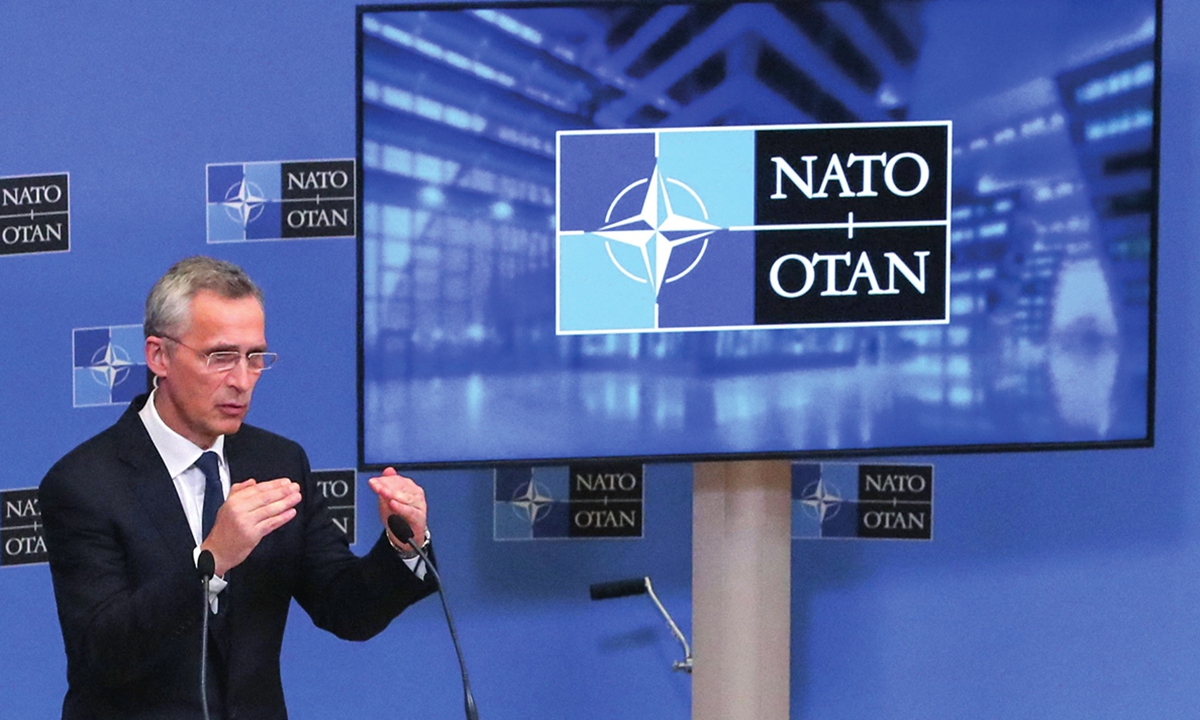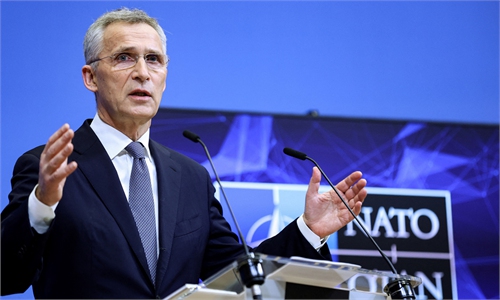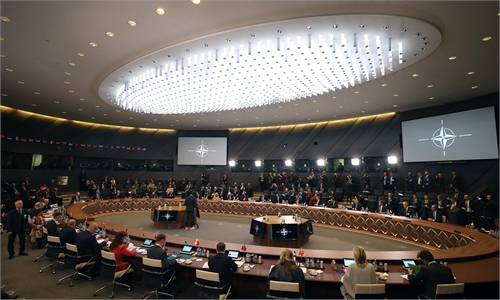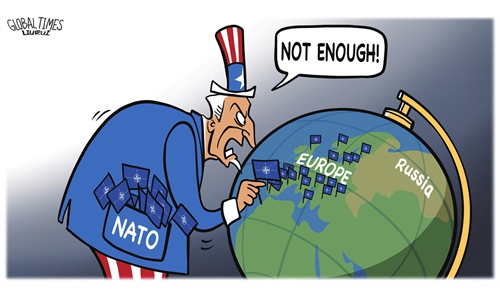NATO chief hypes 'China control' as Europe debates policy direction
Plan to hike defense budget aims at shifting US burden, sowing discontent: expert

NATO Secretary General Jens Stoltenberg. Photo: VCG
When more European leaders are looking for closer interactions with China amid a difficult time and analysts criticized NATO and the US for kidnapping the EU to serve US strategic goals, the NATO chief intensified rhetoric, hyping China's "growing" efforts to control Western infrastructure and key industries with the purpose to strengthen inner unity.During a visit to Spain, NATO chief Jens Stoltenberg warned about "growing Chinese efforts to control" critical infrastructure, supply chains and key industrial sectors and he also said Western countries must be careful not to create new dependencies on China as they are weaning themselves off Russian energy supplies amid the conflicts between Russia and Ukraine, Reuters reported.
While urging allies to increase the resilience of their societies and infrastructure, Stoltenberg also said that Chinese rare earth minerals "are present everywhere, including in our phones, our cars and our military equipment."
This is not the first time for the NATO chief to hype so-called China's control especially after NATO described China as a challenge to the military alliance's "interests, security and values" in its new strategic concept agreed in June.
A background behind Stoltenberg's remarks is an ongoing discussion in Europe and the West on whether their China policies should place more emphasis on cooperation or confrontation. As US' containment strategy against China has not changed, some EU countries argued that "decoupling" or conflict with China is not in their best interests and could plunge them into disaster, Cui Hongjian, director of the Department of European Studies at the China Institute of International Studies, told the Global Times.
Stoltenberg attempted to lead the direction of the policy debate especially when leaders of some European major countries, including Germany and France, have met or plan to engage more with Chinese top leader, Cui said, noting that more high-level interactions between China and European countries are to come with the expectation to advance bilateral cooperation to a new level.
At the beginning of November, German Chancellor Olaf Scholz visited China with a delegation of senior business leaders. Later on November 15, Chinese President Xi Jinping met with French President Emmanuel Macron on the sidelines of the G20 Summit in Bali, Indonesia.
The recent frequent interactions between Chinese and EU leaders have upset the US, a Beijing-based expert who asked for anonymity told the Global Times. As NATO serves the US strategic goal, Stoltenberg's words also highlight US' unwillingness to see the EU deepen relations with China especially at a time when the EU is facing more challenges, said the expert.
Stoltenberg discussed the alleged China's control on infrastructure and supply chains, which, according to the expert, also showed NATO extending its agenda to non-security fields.
Stoltenberg wanted to boost NATO members' cooperation and solidarity by exaggerating the "threat" posed by China, which demonstrated that NATO, as a military alliance, is stuck in the Cold War mindset and that the only way to justify its presence is by fomenting conflict and crises, Li Haidong, a professor from the Institute of International Relations at the China Foreign Affairs University, told the Global Times.
In an effort to force some European nations to apply similar anti-Russian strategy on China, NATO has also worked hard to bind China and Russia together. As a result, the EU may grow more dependent on NATO and the US, and may find it more difficult to achieve strategic autonomy, Li said.
EU's strategic autonomy was also mentioned during Chinese State Councilor and Foreign Minister Wang Yi's phone call with Deputy Prime Minister and Foreign Minister of Italy Antonio Tajani on Monday.
Wang noted that China always sees the EU as a comprehensive strategic partner, supports its strategic autonomy, and hopes for stability and prosperity in Europe. China's policy toward the EU maintains stability and consistency, and remains immune to the evolving international landscape.
China-EU relations do not target any third party, nor should it be limited by any third party. Friends from all sectors of Europe are welcome to pay more visits to China to see the real China and experience China's development and progress, said Wang.
Malicious plan
Stoltenberg said on Monday that NATO allies may also decide to spend more on defense than their current target of 2 percent of national output when they meet for their next summit in Vilnius in July 2023, Reuters reported.
The ongoing conflicts between Russia and Ukraine and the following impact on EU security are used by NATO as excuses to request for an increase in defense spending. The US is exerting more pressure on its allies in the EU to increase their contributions because US' support for EU security domains may decrease as a result of power changes in US Congress, Li said.
More than a week after Election Day, republicans won a narrow majority in the US House of Representatives, setting the stage for two years of divided government as President Joe Biden's Democratic Party held control of the Senate, US media reported.
The US also has a malicious goal in mind when pressing NATO members to raise defense budget. Given the current energy crisis and severe inflation situation in EU, raising defense budget may further cause public's discontent with governments, making it easier for the US to exert influence over governments in EU countries, said the anonymous expert.
The euro zone annual inflation rate was 10.6 percent in October, up from 9.9 percent in September. A year earlier, the rate was 4.1 percent, according to data from Eurostat, the statistical office of the EU. Protests over inflation and rising energy price are brewing in many European countries, including France and Germany, which observers said could be a sign of broader discontent.
According to Cui, Europe's energy issues are primarily supply-related because Russia's supplies have been cut off. However, even if some European countries find alternatives, they will still experience high energy prices in the near future.
In addition, certain European nations, particularly those with significant economies, will lose competitiveness as a result of high energy costs. Cui emphasized that the concern is with the subsequent chain reaction and systemic harm rather than short-term food and energy shortages.
He also noted that as supporting Ukraine has been made politically correct in the EU, the US and NATO have made full use of the Ukraine crisis to reinforce influence in the EU.
Analysts said that NATO's plan to increase defense budget is one way for the US to blackmail the EU, requesting it to serve for a strategic goal set by the US, and as the Russia-Ukraine conflicts continue, the EU would be dragged into more turmoil if they continue to follow the US without realizing independence.



